Substance abuse is a growing concern worldwide, affecting individuals and their families in profound ways. Recognizing the early warning signs of substance abuse and seeking timely treatment can make a significant difference in recovery outcomes. This comprehensive guide will explore the signs of substance abuse, the impact it has on individuals and their loved ones, and the most effective treatment options available.
Recognizing the Warning Signs of Substance Abuse
Early identification of substance abuse can prevent long-term addiction and its devastating consequences. Some common warning signs include:
- Behavioral Changes: Increased secrecy, withdrawal from family and friends, loss of interest in hobbies, and unexplained financial problems.
- Physical Symptoms: Sudden weight loss or gain, bloodshot eyes, unusual body odors, and changes in sleep patterns.
- Psychological Indicators: Mood swings, irritability, depression, anxiety, and paranoia.
- Decline in Performance: Poor work or academic performance, frequent absences, and lack of motivation.
Recognizing these signs in oneself or a loved one is the first step toward seeking help and beginning the recovery journey.
The Impact of Substance Abuse
Substance abuse not only affects the individual using drugs or alcohol but also has widespread consequences on their family, friends, and society. Some of the most common impacts include:
- Health Problems: Long-term substance abuse can lead to liver damage, heart disease, respiratory issues, and mental health disorders.
- Relationship Strain: Addiction often leads to conflicts, broken relationships, and social isolation.
- Legal and Financial Issues: Increased risk of legal trouble, job loss, and financial instability due to excessive spending on substances.
- Emotional and Psychological Toll: Loved ones often experience stress, anxiety, and emotional exhaustion while trying to support someone with a substance abuse disorder.
Effective Treatment Options for Substance Abuse
Successful recovery from substance abuse requires a combination of medical, psychological, and social support. Some of the most effective treatment options include:
- Detoxification (Detox): The first step in recovery, detox helps remove substances from the body under medical supervision to manage withdrawal symptoms.
- Behavioral Therapy: Cognitive Behavioral Therapy (CBT), Dialectical Behavior Therapy (DBT), and Motivational Interviewing (MI) are commonly used to address the root causes of addiction and develop coping mechanisms.
- Medication-Assisted Treatment (MAT): Medications like methadone, buprenorphine, and naltrexone help reduce cravings and withdrawal symptoms, especially for opioid addiction.
- Support Groups: Programs like Alcoholics Anonymous (AA) and Narcotics Anonymous (NA) provide peer support and accountability throughout the recovery process.
- Rehabilitation Programs: Inpatient and outpatient rehab facilities offer structured treatment plans, counseling, and relapse prevention strategies.
The Road to Recovery
Recovery from substance abuse is a lifelong journey that requires dedication, support, and continuous effort. Developing a strong support system, setting realistic goals, and prioritizing mental and physical well-being are essential for long-term sobriety. With the right resources and commitment, individuals struggling with substance abuse can reclaim their lives and build a healthier future.
By understanding the warning signs and seeking timely intervention, individuals and their loved ones can take proactive steps toward recovery and a better quality of life.
